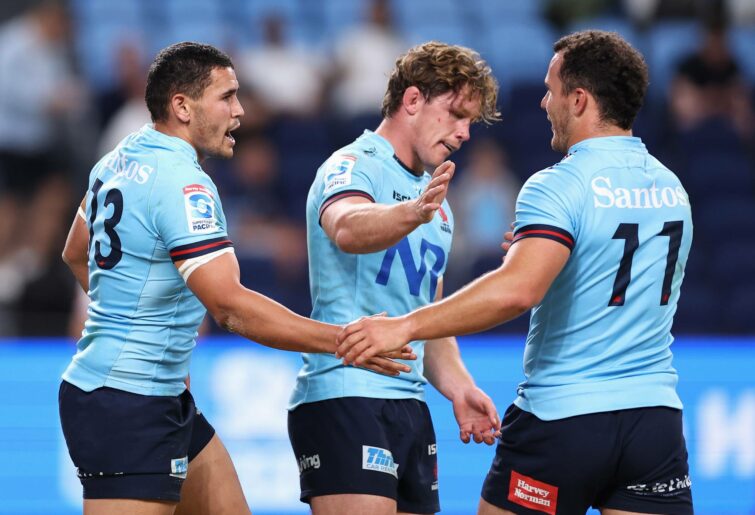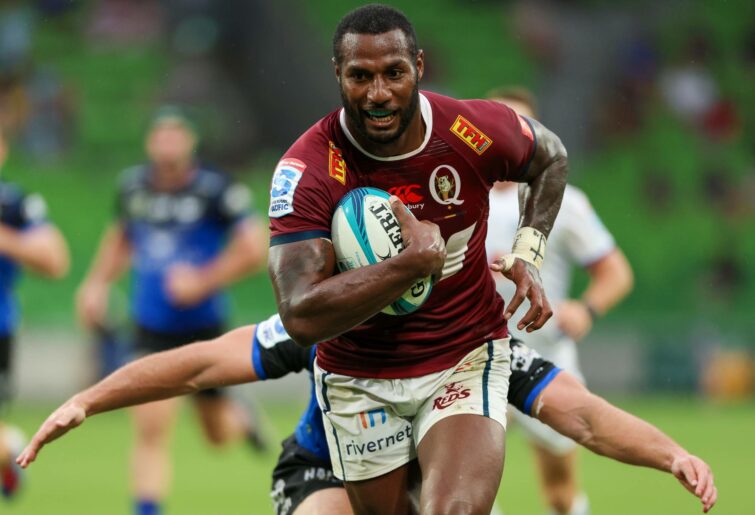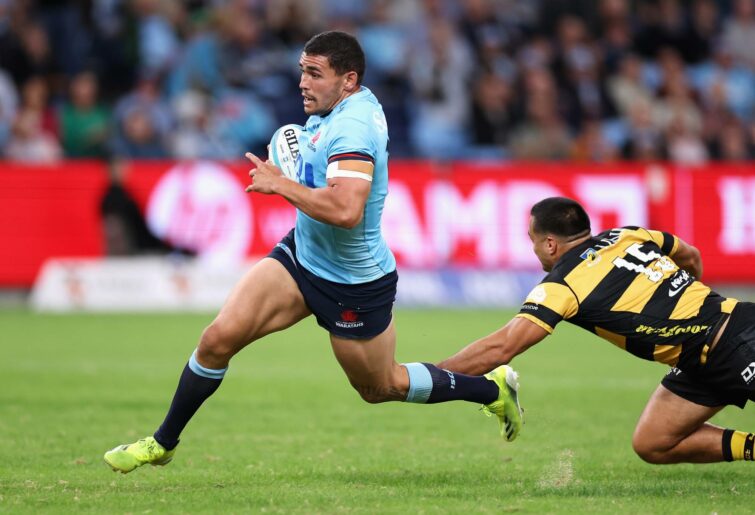With rugby under siege for a diminishing ability to provide entertainment value, a suite of changes was introduced this year to Super Rugby, primarily designed to speed up the game.
One was a modification around the TMO process, which has resulted in referees taking more responsibility for on-field decisions, decisions being arrived at faster, and the referral of potential red card decisions to the TMO, instead of the referee being required to act as policeman, judge and jury.
As a result, there have been substantially fewer TMO/referee interactions this season, and far less sitting around watching replays on the big screen.
Until now. Perhaps it was the Easter chocolate kicking in, or maybe it was relevance deprivation syndrome writ large, but TMO’s were back in business over the weekend. And I suspect you’d have to travel a long way to find anybody who thinks that’s a good thing.
In Canberra, referee Damon Murphy found himself being interrupted by his TMO Brett Cronan, who was keen for Murphy to investigate a “possible obstruction” in the lead-up to a try. Upon replay, it was readily apparent that any case for obstruction, if there was one, would have been pedantic and highly technical.
In what just might be his finest moment as a referee, Murphy trusted what he saw, deemed it unworthy of his attention and, perhaps more politely than what the situation deserved, sent Cronan packing and got on with the game.
Similarly, Jordan Way, near the end of the Hurricanes versus Chiefs clash in Wellington, was summonsed by his TMO Richard Kelly, to investigate foul play on Jordie Barrett. Same deal. After waiting for the replay to appear, Way found what anybody familiar with rugby could see for themselves; there wasn’t even a hint of foul play against Barrett.
The point isn’t that these two instances ruined the viewing spectacle for everyone watching, or had an influence on the match outcome. They didn’t.
But they are symptomatic of a problem that rugby thought it had got rid of, creeping back in. TMO’s are tasked with helping the referee adjudicate on tries, and to advise the referee around acts of foul play that the referee may have missed, in the run of play.
It is surely not the role of the TMO to stop the flow of the game and have the referee consider a 50/50 action that may or may not have a bearing on the play. In Kelly’s case, no try had been scored or was being claimed. Kelly simply thought that Barrett, laying on the ground, may have had a Chiefs player dive on top of him.
He hadn’t, as referee Way, rightly pointed out. But even if he had, so what? That’s a matter for the referee to rule on, and is most certainly not grounds for a TMO to stop proceedings and call a pow wow over.
With fewer things to worry themselves over, logic suggests that TMO’s should then be able to focus their attention on things that actually matter; like players putting their foot on the touch line, in the lead-up to a try.
In this case it was TMO David Conway, who told referee Angus Gardner that “it wasn’t clear and obvious” that Mahe Vailanu had stepped into touch before delivering the final pass for Izaia Perese’s late try in Sydney.
Unfortunately for Conway, it was a simple exercise for anyone watching from their sofa to play ‘home TMO’ and demonstrate that in fact it was clear and obvious that Vailanu had stepped out before releasing the ball.
Had some of the copious amount of sand that draped the Sydney Football Stadium found its way onto Conway’s TV monitor? Once again, this decision had no bearing on the final result, but it did provide the Waratahs with a three-try margin bonus point and, in a competition log-jammed with sides seeking play-off spots 6-8, it could well prove to be a decisive call.

Izaia Perese of the Waratahs (Photo by Cameron Spencer/Getty Images)
As everyone who has played or officiated knows, refereeing is a tough job; at any level of the game. For the most part, the game is well-served by its whistle-blowers. But to be critical of Way, he was far too generous to the Chiefs, failing to issue a yellow card for repeated infringing, as the Hurricanes mounted a final-quarter assault on their line.
And how about the referee in the Brumbies versus Rebels Super W match who, after the under-seige Brumbies conceded their ninth second-half penalty to none for the Rebels, finally called the Brumbies skipper over to wag a finger and issue a “next time” warning?
But there was triumph too; Gardner celebrating his 100th Super Rugby match; and unlike many players these days who interchange to and from the bench, playing out the whole 80 minutes in all of them.
Speaking of old habits creeping back in, Darcy Swain, in his first start after a long lay-off, didn’t take long to find himself back on the naughty chair, for blatantly cynical offside play, in the first half.
Disappointingly for Swain, he, along with a number of other injured players, later found himself ruled out of this weeks’ Wallabies’ camp, the first held under new coach Eddie Jones.
Some of them will get their opportunity again, others may not. The World Cup clock is ticking and Jones can afford only to deal in currency that has present – not past or future – value.
For 40 minutes on Friday afternoon it looked as if one player who Jones had publicly backed, Suli Vunivalu, had finally stepped out of the substantial shadow that seems to have enveloped his whole Super Rugby career.
Perhaps for the first time in a Reds’ jumper, Vunivalu had an influence on the result of a match; involved to a far greater extent than previously, running dangerously, and pulling off a crucial intercept. By the end of play he had reverted to type – barely sighted in the second half – but at least here was some inkling of what Jones had been spruiking about his ex-Melbourne Storm winger.

Suliasi Vunivalu of the Reds (Photo by Asanka Ratnayake/Getty Images)
Also putting his case forward was No.8 Harry Wilson, who could be heard urging his dominant scrum to “eat ‘em alive” as Moana Pasifika continued to struggle at set piece.
Wilson doesn’t really convince as the cannibal type, at least not in the sense that, say French lock Sebastien Chabal did, but by the end of the weekend he was also on his way to the Gold Coast to join the Wallabies squad, beneficiary of Langi Gleeson’s late withdrawl.
The Reds’ 40-28 win was well deserved, the visitors managing the oppressive conditions well, and finishing off their chances when they arose. The only real regret was that the side flew in late and left early; there were issues around scheduling, but it can only be hoped that teams travelling to the islands in the future, spend more time on the ground, enjoying the hospitality and helping spread the rugby gospel.
For the hosts, it was another frustrating night; some spectacular tries and another commanding performance from flanker Miracle Vialagi, spoiled by patches of passive defence and a scrum that is short of Super Rugby standard.
Entering the final ten minutes in Canberra, the Drua were a credible winning chance, and in fact they took the lead momentarily before TMO Cronan, to his credit doing exactly what he is there to do, alerted Murphy to a knock-on moments before the ball was forced.
It was to be the visitor’s final opportunity, as the Brumbies machine clicked in for long enough for them to regain territorial advantage and allow the Honey Badger-esque Ben O’Donnell to end the game as he started it, icing a 43-28 victory.
A well-documented threat in home conditions, here were signs of the Drua offering a far more formidable threat away from home; all of their loose forwards running strongly, along with impressive centre Iosefo Masi. They remain a valid contender for a finals berth.
At the loftier end of the ladder, the Chiefs knuckled down when they needed to, impressively putting away the Hurricanes 33-17, in Wellington. It was as if coach Clayton McMillan was happy to let his players have their heads in the first half but, needing to turn around a 17-8 deficit, laid down the law for more direct ball-carrying in the second.
It helps having the cattle to do just that, with Samisoni Taukei’aho, Brodie Retallick, Sam Cane and Pita-Gus Sowakula all hungry for work. Although it was the thrilling 9th minute try to centre Daniel Rona which illustrated one of the key differences that remains evident, between New Zealand and Australian sides.
Working off turnover ball, the inherent understanding that this can be the best ball to use, and the willingness to quickly shift the point of attack into space sparsely inhabited by defenders, still eludes too many players on the western side of the Tasman, whose first instinct, too often, is to excitedly kick the ball away, to gain territory that way.
On the Sydney sandpit it was Force fullback Chase Tiatia who caught the eye, but for all the wrong reasons. Always a rocks or diamonds player, Tiatia mined a whole quarry full of boulders, somehow coming closer to splitting the goalposts with a penalty kick, than his intended touchline target.
Despite their dodgy late bonus, 36-16 felt like a true and just reflection, with the Waratahs efficient enough when it counted, and the Force once again too slow out of the blocks.
Perese was another to get a late Wallabies camp call-up; fully deserved for his convincing performance. Of more long-term concern however, might be fledging fullback, Max Jorgensen.

Izaia Perese of the Waratahs (Photo by Cameron Spencer/Getty Images)
An undoubted talent who warrants his squad inclusion on merit as well as potential, Jorgensen was found short – in all senses of the word – when Manasa Mataele towered over him to field a cross-field bomb and score, in the 60th minute. It wasn’t hard to imagine England coach Steve Borthwick, messaging Owen Farrell and Freddie Steward before Mataele’s feet had barely regained contact with the ground.
Perhaps Eddie did the messaging for him? After all that’s just the kind of cheeky thing Jones might do, backing Jorgensen in to deliver next time. And after all, no matter who is paying the wages, you don’t turn your back on seven-plus years of mateship just like that.
One thing we do know for certain about Jones is that, even if the timing of this camp, coming as it does in the middle of Super Rugby season, precludes him from delivering his players a physical flogging, they can expect to leave the Gold Coast fully cognisant of what expectations have been set for them. Those expectations will be high.
24 years without World Cup success; now rising 20 years without Bledisloe Cup success. Those are old habits that simply need to be broken.































































































